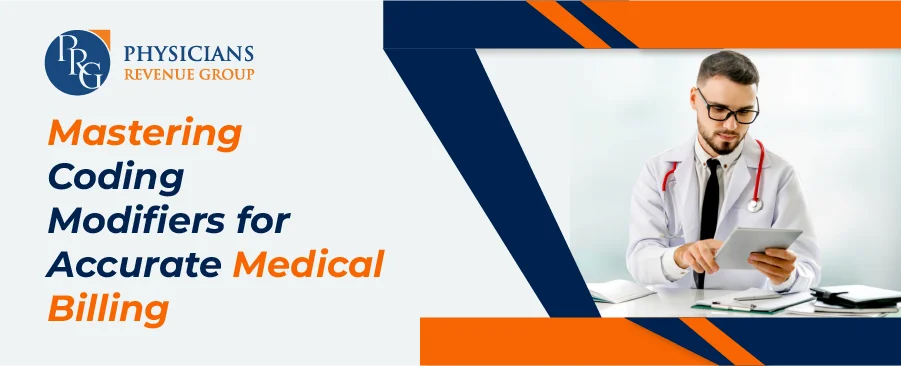
Email: info@prgmd.com | Call: +1 (630) 242-6474
Business hours: 9:00 to 5:00 | Monday to Friday
Email: info@prgmd.com | Call: +1 (630) 242-6474
Business hours: 9:00 to 5:00 | Monday to Friday

Table of Contents
ToggleMedical coding consists of various working parts, and it is necessary to understand all of them to code diagnoses and treatments correctly. One part of the healthcare industry that needs more attention is the usage of coding modifiers. The simple aspect of medical coding plays a significant role in claim reimbursement. These modifiers demonstrate various healthcare scenarios and are actively a part of almost every specialty. Therefore, medical billing services providers must pay attention to reviewing them before they submit healthcare claims.
Medical billing is the financial backbone of any healthcare practice, including clinics. Accuracy in billing and coding ensures providers receive payments on time. Incorrect billing can lead to delayed payments or claim rejections, significantly impacting a clinic’s financial stability.
Accurate billing is vital to adhere to various healthcare regulations, including coding, documentation, and privacy (such as HIPAA in the United States). Non-compliance with these regulations can result in legal consequences, fines, and damage to the clinic’s reputation.
Accurate billing not only benefits healthcare providers but also patients. It helps patients understand the costs of their medical treatments. This transparency enhances patient satisfaction and fosters trust with the healthcare provider.
Precise healthcare billing also contributes to patient records and healthcare data accuracy. When billing and coding are exact, it can be invaluable for future reference and patient decision-making.
Finally, accurate billing enables healthcare providers to concentrate on their core competency – delivering exceptional patient care.
Two characters, letters, or numbers make up a medical coding modifier, and you attach it to a CPT or HCPCS Level II code. The American Medical Association (AMA) and the Centers for Medicare & Medicaid Services (CMS) define a modifier as a billing essential that signifies or communicates a specific circumstance.
When processing a claim, healthcare professionals attach modifiers to CPT and HCPCS codes to provide extra information about a medical procedure or service. This preserves the basic meaning of the code. In other words, modifiers indicate a service that CPT can’t. Still, it doesn’t change the code itself. However, Modifiers clarify why a physician or other qualified healthcare professional provided a specific service or procedure.
The journey to mastering coding modifiers presents its share of difficulties. Healthcare financial management is complex due to its intricate procedures, regulations, and varying rules of insurance providers.
Listed below are some of the common challenges that medical billers encounter:
In order to excel in coding modifiers and guarantee precise healthcare billing, medical billers, and healthcare practitioners can adhere to the following crucial suggestions:
Learning how to use coding modifiers in healthcare billing is very important. It helps healthcare providers receive reimbursement fairly, reduces denials and rejections, and clarifies the healthcare system.
To get good at coding modifiers, stay informed, accurately write down what you do, and teach your staff. As healthcare changes, keeping up with new rules and technology is crucial for successful billing.
Getting billing right is not just suitable for healthcare providers, but it also helps give quality care to patients. It is a big part of the healthcare world that ensures medical practices get what they deserve. However, learning to use coding modifiers is a step toward these critical goals.
Here’s how:
Share:
Categories
Recently Added

What is an ABN in medical billing?

What does a Clearinghouse do During Claims Submission?

What is EOR in Medical Billing?
We Would Love to Assist You!
We treat your data confidentially and don’t share any information with a third party.